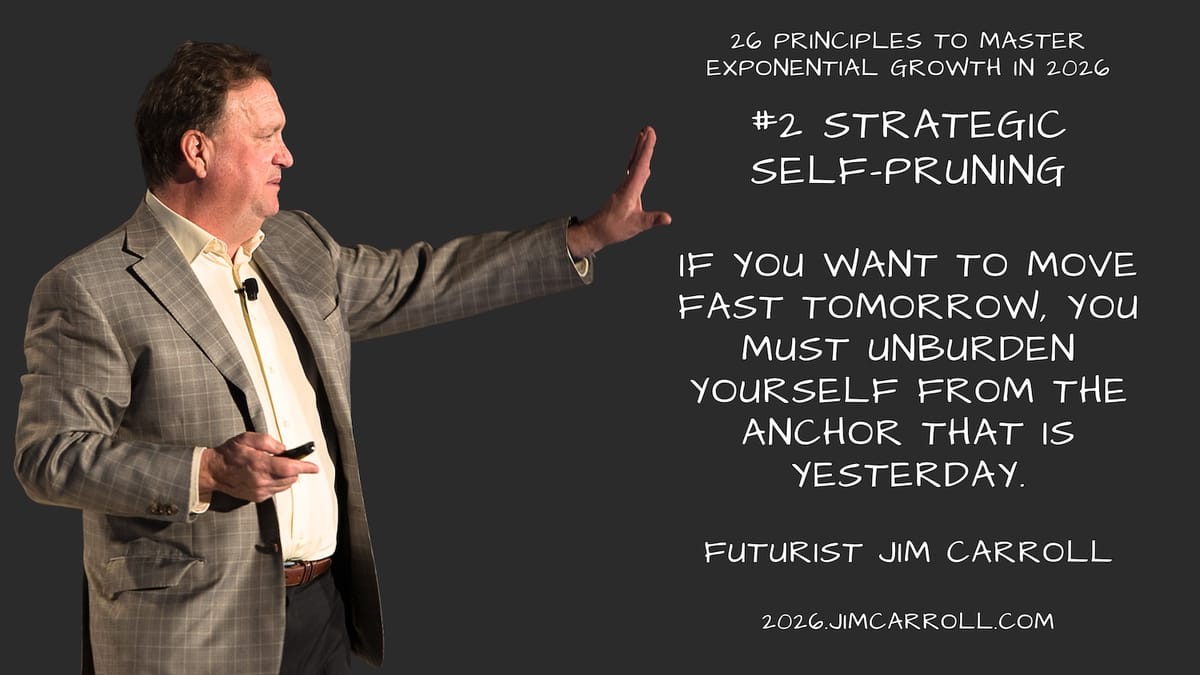"If you want to move fast tomorrow, you must unburden yourself from the anchor that is yesterday." — Futurist Jim Carroll
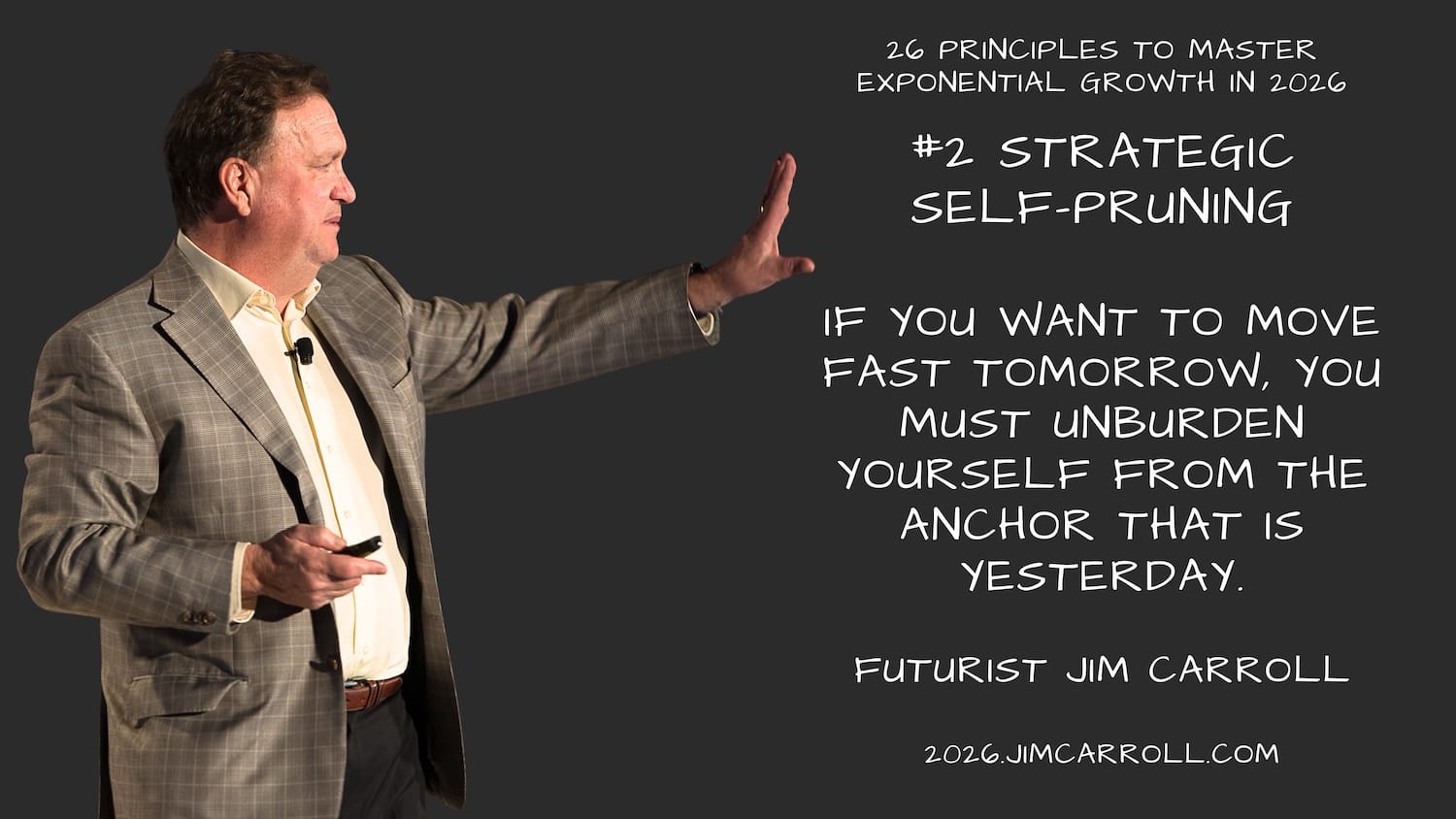
Futurist Jim Carroll is writing his end-of-2025 / introduction-to-2026 series, 26 Principles for 2026. You can follow along at 2026.jimcarroll.com. He welcomes your comments.
Day 2: It's all about "Strategic Self-Pruning" - think of it as shedding your past to fuel your future speed.
Let's start here.
Old habits die hard. In an exponential world old habits need to die faster.
If Day 1 was about resetting your internal clock, Day 2 is about getting a new clock altogether.
We live in an era where the half-life of a profitable business model, a valuable skill set, or a dominant market position is shrinking exponentially. Remember that line I often share? What used to last a career now lasts a decade; what lasted a decade now lasts a few years.
That skill you had two months ago? It's out of date already!
How fast are things? As someone who lives for the future, I can barely keep up. Every day involves a flood of new ideas, new capabilities, crazy new concepts. Case in point? Google Gemini announced their latest image model yesterday. Moments ago, it took this very post and summarized it in about 10 seconds, like this. (This was before I made a few edits to the content along the way.)
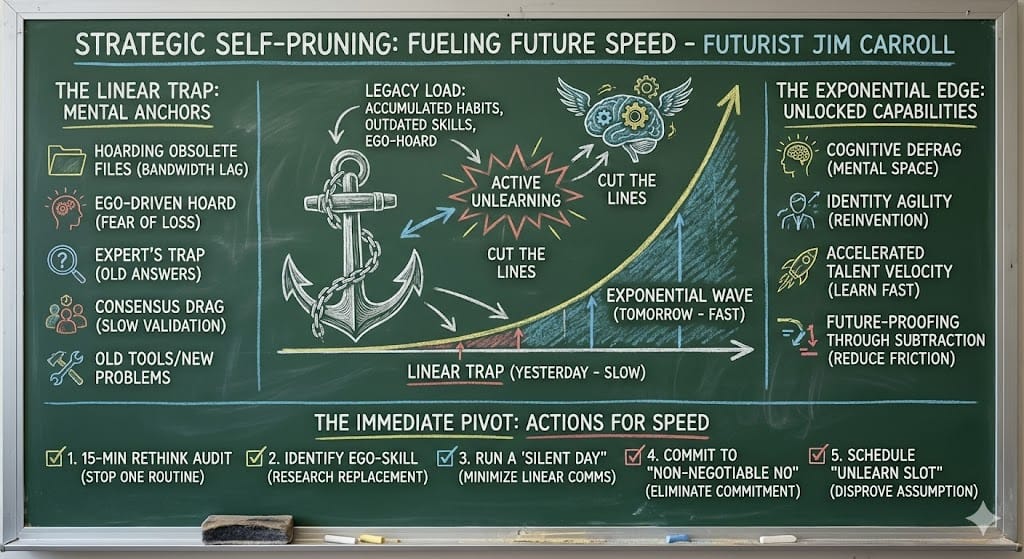
Or how about yesterday's' post as a magazine article? 10 seconds, start to finish.
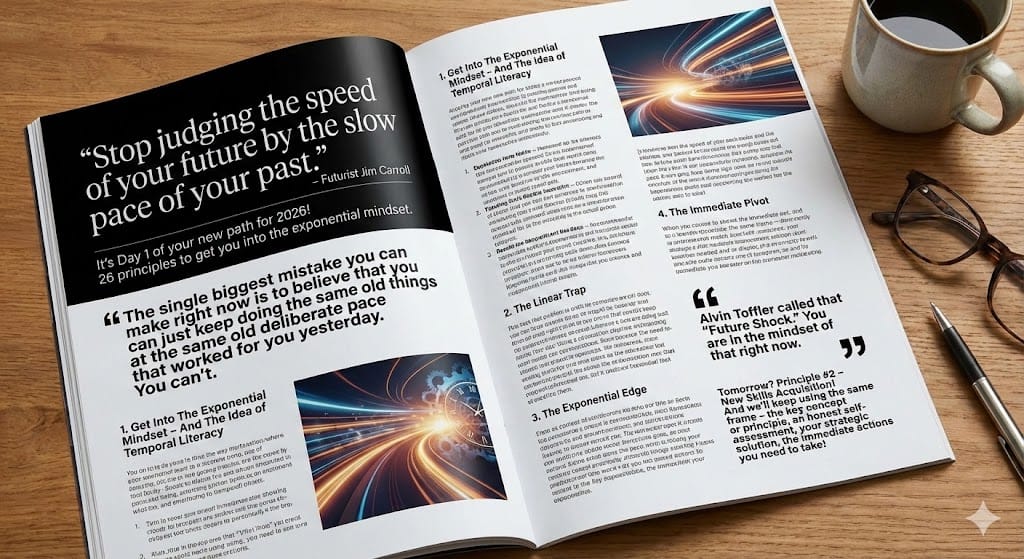
Or, Operation Slumberfall. I created this for my son and his wife, new parents with a 4 month old, asking it simply create, based on typical sleep patterns, what they are going through. They said it's pretty accurate.
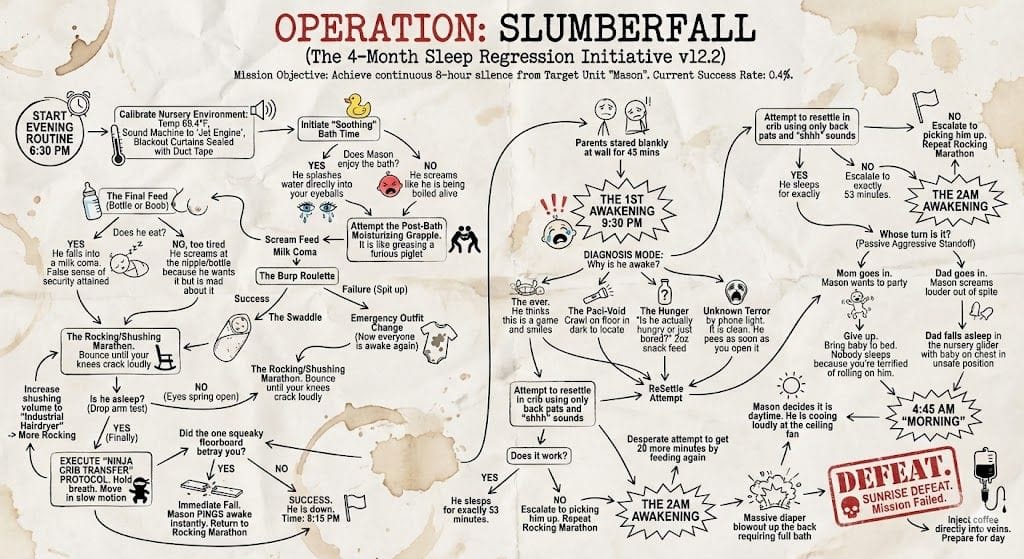
Is this just some weird new AI eye-candy toy skill, or valuable new knowledge? I have no clue - but if you spend any time on social media today, you'll see everyone sharing all these weird new skills in real time. Next week? New things, new skills. Five years out? We won't recognize who we are and what we can do.
How do you possibly keep up in a world which is changing so crazy fast?
By getting rid of your anchors! You need to learn how you can run free and figure out what the heck is going on, and what you need to do be a part of it. And to do that, you need new habits - to ingest new knowledge, learn new skills, scan new horizons, take new risks, and chart a new path forward.
Look, I think you might be reading this series because you really want to figure out how to move forward in 2026. So here's the thing - one of the most important things you need to do is get rid of your past habits, ideas and routines to build a different future.
In my work with global organizations, I see the same pattern repeat: the greatest barrier to future velocity isn't a lack of new ideas; it's the crushing weight of old ones. Let's call it the "Legacy Load"—the accumulated mental habits, comfortable routines, and once-valuable expertise that now act as an anchor in a tidal wave of change.
To catch the exponential wave, you must stop hoarding the past.
Let's put this into perspective.
1. The Exponential Mindset
Here's what you need to achieve - the ability for what I call "Strategic Self-Pruning". It's an intentional, continuous, and often uncomfortable act of active unlearning. It is recognizing that in an exponential world, your current knowledge base is depreciating faster than ever before. This discipline requires you to ruthlessly identify and eliminate obsolete mental models, successful but outdated skills, and personal routines to create the necessary mindset to absorb new stuff.
You must prune the linear deadwood to fuel exponential growth.
It means keeping an eye on all the crazy new developments that are redefining everything - such as an AI image generator that creates an accurate image of the challenge faced by new parents in but 10 seconds!
2. The Linear Trap
To do this, you need to get out of the trap in which you are imprisoned. Your mindset prison. The attitudes and skills that are holding you back.
Ask yourself if you are guilty of these habits. They are the mental anchors that chain you to yesterday's pace, ensuring your personal growth remains linear while the world accelerates around you.
- Hoarding obsolete mental files: Are you treating every past project, piece of knowledge, or established connection as an equally valuable resource that must be maintained. Are you wasting ridiculous amounts of time hoarding old knowledge, or revisiting it? This creates cognitive bandwidth lag, where your mind is too cluttered with linear data to rapidly process exponential opportunities.
- Linking all your success to what you've done - not what you could do: Allowing your personal identity or sense of professional worth to be tied to a past achievement or skill set that the market is currently automating or obsolescing. You fear pruning it because it feels like a loss of self, rather than a necessary evolution.
- Believing what you know is what you need to know: Believing that your deep experience in a specific domain protects you from disruption. In reality, when the underlying rules of an industry change exponentially, deep expertise in the old way becomes the fastest route to irrelevance when new ways are being invented at speed.
- Chasing consensus constantly: Do you require broad internal agreement or validation from peers before testing a radical new idea or skill? This will just slow you down and prevent you from chasing the individual experimentation you need to keep up.
- Solving a new problem with the same old tools: Failing to update your fundamental toolkit (software, methodology, or thought process) to match the problem's complexity. You are using linear hand-tools in an exponential power-tool world!
3. The Exponential Edge
By mastering Strategic Self-Pruning, you don't just reduce friction; you unlock a powerful new set of capabilities adapted for speed:
- It's a cognitive defrag: Remember when we used to have to 'defrag' our hard drives (this will age you!) It's almost the same type of thing - you free up vast amounts of mental space previously consumed by maintaining obsolete information, allowing you to focus entirely on complex, non-linear problem-solving.
- Identity agility: You detach your professional worth from any specific, past skill, enabling continuous professional reinvention without the emotional cost of "loss." This is huge, because you'll take more risk and you become comfortable being a novice in a new, high-growth field!
- Just-in-time knowledge: You shift your focus from knowing it all to learning it fast. You ensure your mental energy is dedicated to the most advanced skill acquisition, not the maintenance of comfortable, decaying expertise. I still think this is the most important skill you can develop!
4. The Immediate Pivot
So what do you do? Decide the journey to an unburdened future begins right now. Here are the immediate actions you must take to start cutting the anchor:
- Do a 'thinking audit': Identify one long-standing routine (a recurring meeting, a standard report, a habitual task) and write down the specific reason why it is no longer necessary in an AI-driven, accelerated world. Then stop doing it.
- Identify Your "Ego-Skill": Name the one professional skill you are most proud of but that you secretly suspect will be automated or marginalized in the next three years. Commit 30 minutes this week to researching its replacement skill.
- Commit to One "Non-Negotiable No": Eliminate one recurring commitment that consumes a lot of 'linear' time but yields no exponential return on your future goals.
- Schedule a Mandatory "Unlearn Slot": Block out an hour and dedicate it to actively disproving an assumption about your in industry that you have held for more than five years. Find the data that proves your old expertise is wrong.
- Waste more time: Don't worry about constant productivity - start to view unproductive time as investment time!
- Play more: do frivolous things, viewing this as one of the most valuable ways to learn new stuff.
Ultimately, you cannot build tomorrow's career on yesterday's foundation.
How about this for your go-to phrase: the future belongs to the unburdened—the people willing to do the hard, necessary work of letting go.
So, take a hard look at the skills, habits, and assumptions you're holding onto.
Are they wings that will help you fly in this accelerating world, or are they anchors dragging you down?
Oh, and by the way, here’s today’s post, summarized.
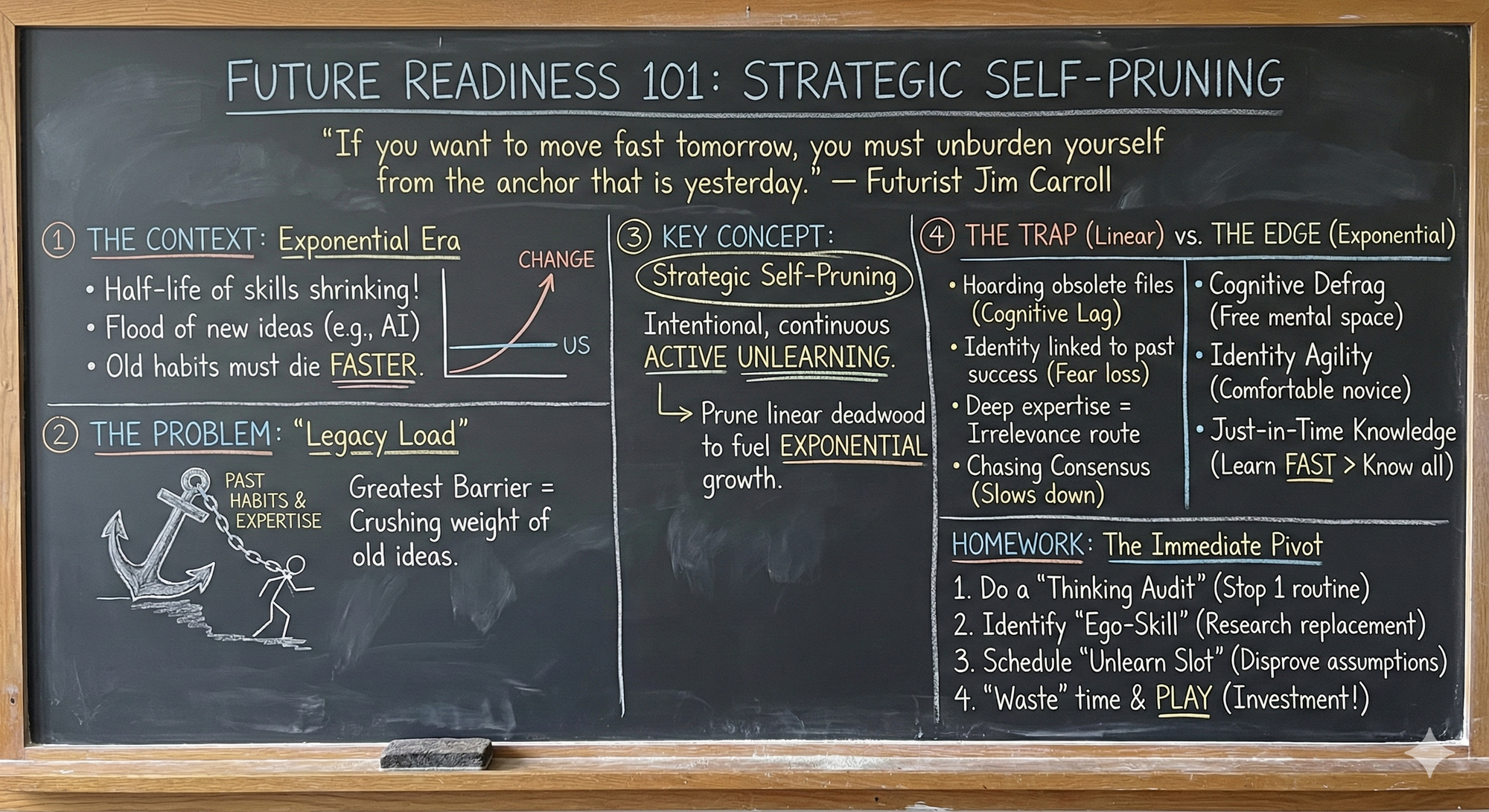
Futurist Jim Carroll wastes a lot of time playing with new ideas in order to discover the ideas that will help him learn the new things that matter.
.

